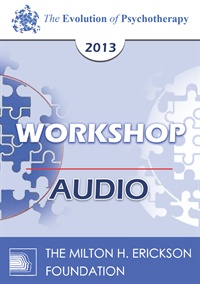EP13 Workshop 12 - Global or Overgeneral Thinking and Mental Health: The Therapeutic Merits of Concreteness and Specificity - Michael Yapko, PhD
- Average Rating:
- Not yet rated
- Topic Areas:
- Workshops | Psychotherapy | Therapeutic Relationship | Therapist Development
- Categories:
- Evolution of Psychotherapy | Evolution of Psychotherapy 2013
- Faculty:
- Michael Yapko, PhD
- Duration:
- 2 Hours 47 Minutes
- Format:
- Audio Only
- Original Program Date:
- Dec 11, 2013
- License:
- Never Expires.
Description
Description:
Why does a grown adult need to be reminded by a therapist that he or she no longer needs to feel or act like a helpless child? Why does someone treat a new boyfriend or girlfriend unfairly as if he or she is the same as the last one who hurt him or her? One answer: Global thinking. Most people – therapists included – are global thinkers, people who metaphorically “see the forest but not the trees.” Global thinking is highly correlated with depression as well as PTSD. It’s also a basis for giving bad therapeutic advice. What forms does global thinking take, and what can therapists do to address this cognitive style? In this workshop, we will consider the role of global thinking on diverse symptom presentations, do an exercise in building and teaching discrimination criteria, and highlight the importance of teaching concrete and specific skills in making distinctions that lead to improved decisions and, subsequently, better mental health.
Educational Objectives:
- Describe the role of global cognition in a variety of presenting problems.
- Design strategies of making key discriminations for improved decision-making.
- Apply the patterns of specificity to the process of offering therapy clients advice and direction.
*Sessions may be edited for content and to preserve confidentiality*
Credits
Faculty

Michael Yapko, PhD Related Seminars and Products
Michael D. Yapko, Ph.D. (professional psychology, clinical specialization), is internationally recognized for his innovative work in applied clinical hypnosis, developing brief psychotherapies, and the strategic treatment of depression. He has been invited to present his work in more than 30 countries across six continents. He is the author of 15 books, including his most recent, The Discriminating Therapist. He is a recipient of numerous awards for his many contributions to the field, including the Milton H. Erickson Foundation Lifetime Achievement Award.


